
February 11, 2014, by Christina Lee
Undying Love
I met my love in the first year: it was one of those strange encounters with a new culture which I had not heard of before. I am talking about my love for all things medieval here – a love that has outlasted almost everything else. I fell for it deeply: ‘the Discreet Charm of the Old English Weak Adjective’ (an essay by Roberta Frank, 2003), the wonders of Beowulf and the marvels of Old Norse mythology. I am now in the lucky position to have gone from ‘study what you love’ to ‘teach what you love’.
Just as any proud lover, I get quite frustrated when people use the term ‘medieval’ in a derogatory manner. The Middle Ages are a period of extreme complexity, and many thing that are denounced as medieval today actually did not happen as such, and the flat earth myth is a good example for it. There is, however, one thing for sure: human emotions were just the same then as now. Love, lust and passion can be found in many medieval texts. Perhaps one of my favourite poems is Wulf ond Eadwacer, preserved in the tenth-century Exeter Book. The poem is cryptic and there are many interpretations, but essentially we can confirm that there is a female speaker who is telling us that if her lover comes anywhere near her own people he will be killed. Sounds familiar? Family feud and star-crossed lovers who cannot be together on account of such disputes? Although this poem precedes Shakespeare by at least 500 years, it shows that tales of lovers were popular in all ages. We have no idea if the man named Wulf and the female speaker have a happy ending – the poem closes with a statement that people so easily tear apart their common tale.
The female speaker in Wulf – angry, passionate, confident and clearly very much wanting her lover to come back – is an example of just how timeless Old English poetry can be. This is not the only poem who laments the absence of her man in this manuscript, but interestingly we also have a male voice who wishes to hasten his lover’s return in the poem which has been named later as The Husband’s Message. In this poem a man is asking his partner to join him by sending a message on a rune stick. The man, it turns out had to leave his homeland because of a political feud and is now in a position to ask his lover to come and join him. What makes the poem so appealing is the urgency – he asks his partner not to delay, not to be stopped by anybody.
The very sparseness of these poems is one of the features that allows them to speak to us today. We don’t need to appreciate the specific politics of the situation to understand the emotion. We are invited to identify heart and soul with the speakers, to see that human erotic love, in its blend of corporeal and spiritual, may be close to a constant of human experience.

[…] it’s important to study what you love at University. Subjects included History, Chemistry and Medieval studies. Professor Stephen Mumford over on the Arts Matters blog also reminded us of the importance of […]